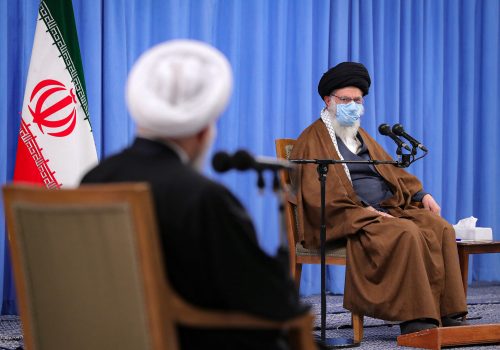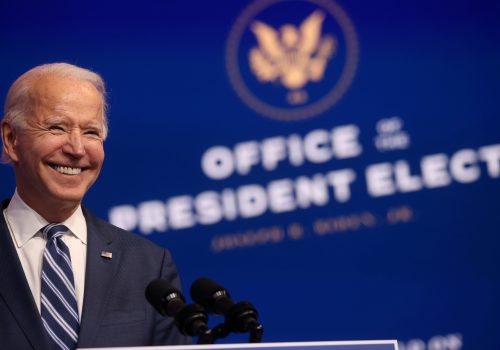What MENA leaders should expect from the Biden administration
During a Joe Biden administration, wise leaders of the Middle East and North Africa (MENA) region would do well to pay more attention to career diplomats and senior military officers than was common in the past four years. They should also stop looking for shortcuts to the White House, as it would be a mistake to try to pull a fast one on experienced elected leaders and their political appointees. This is not their first rodeo. Additionally, MENA governments should pay careful attention to shifting priorities and policy agendas if they aim to maintain or improve relations with Washington.
A Biden administration will deal in trust and expertise
Compared to his recent predecessors, President Biden does not rely on his gut instincts or carry prejudices against the Washington establishment based on a career in state politics or business. Like George H.W. Bush and the experienced team of Brent Scowcroft, James A. Baker, Dick Cheney, and Colin Powell, the top layer of the Biden team is eager to return order to Washington policymaking and reliability to its implementation. That’s not to say personal eccentricities and private agendas will disappear. Human nature does not change that much. But foreign governments dealing with Washington will find that these are not paramount considerations.
This will be bad news for some Washington influence peddlers. It is likely to become harder to get a transactional deal, though agreements will be more reliable once reached. Trust and expertise will gain more currency in Washington than cleverness and novelty. Foreign officials should be skeptical of people who claim special access to the Biden White House and offer their services for a fancy price.
The first appointments to top jobs showed Biden’s appreciation for experienced professionals. He chose advisors he was close to in the Barack Obama administration and experts who had been with him in the Senate. But he also reached into the ranks of retired career military officers and retired career diplomats for cabinet picks and other top jobs. This sends a signal that the Biden White House will value merit. Performance, rather than personal loyalty, will determine how the president judges members of his team and the advice they give him.
Along with changes in the executive branch, it is likely that a sharply divided Congress will become more assertive. National security policies and alliances that last from one president to the next are essential but hard to implement. They normally require a high degree of compromise between the executive departments and senior leaders from both the majority and the minority of Congress. Foreign governments that have found it safe to ignore the views expressed on the Hill are likely to face disappointment.
What’s on Biden’s agenda—and what’s not
It will no longer be safe to dismiss attention to human rights by both Congress and the Biden team as sanctimonious and transient. The US government’s record on these matters has been very mixed and charges of double standards are often correct. Nonetheless, concern for human rights reflects very real public opinion. Arab governments are often targets for Muslim-bashing or anti-foreign prejudices, but a dialogue with the State Department about its annual human rights report on country X is better than dismissing it as tedious and pro forma.
However, an ambitious push by the Biden administration for electoral democracies to replace existing autocratic systems is unlikely. Biden is all too familiar with the pitfalls that have followed abrupt political change in Iraq and other Arab countries. That said, Middle Eastern leaders need to be aware that maintaining their power as part of regional stability will not excuse blatant disregard for human rights. When women activists in Saudi Arabia or Kurdish activists in Iraq or Turkey make the governments in Riyadh, Baghdad, and Ankara uncomfortable, those governments should handle them with care. Western-based human rights organizations and the US media are watching and applying pressure on Congress and the administration. Leaders in Cairo and Jerusalem should be aware that Biden does not have a favorite dictator and that his affection for Israel does not extend to the current prime minister.
Leaders must be ready to adapt to Biden’s foreign policy priorities in the Middle East
The Israeli government has a breathing period before Washington will again approach the knotty problem of peace with Palestinians. But normalization with distant Arab governments is not the same as peacemaking and not a substitute for dealing with Israel’s existential dilemma. Like most Americans, Biden grew up with the notion that Israel was a democratic state with a Jewish majority population. That no longer reflects the demographic reality in the land between the Mediterranean and the Jordan River. For now, Israel and the United States see other issues as more urgent. Eventually, though, Israel will have to deal with the humanitarian disaster in the Gaza Strip and the rights of the Palestinians subject to its control.
Biden foreign policy will favor avoiding engagement in land operations by US military forces in the region. This continues the trend of both the Obama and Donald Trump administrations. A cautious approach has wide public support. A corollary will be growing irritation in Washington at the policies of some Arab states and Turkey that serve to perpetuate conflicts and humanitarian suffering in Yemen, Libya, and Syria. Add to this the pressure to end the disarray among the Gulf Cooperation Council (GCC) states—a situation that impedes GCC cooperation with the US, while encouraging Iran to make trouble. Saudi Arabia was prudent to take initial steps to resolve the GCC conflict. Qatar, the United Arab Emirates (UAE), Bahrain, and Egypt would be wise to keep the momentum going.
Saudi diplomats will face serious problems in Washington. They range from the humanitarian disaster in Yemen to outrages against Saudi citizens well-regarded in US political circles, including human rights activists and former Saudi officials who worked closely with US counterparts in cooperative efforts against common adversaries like al-Qaeda.
On the other hand, the UAE has improved its image in various ways, such as trimming its role in Yemen and normalizing inter-action with Israel through the Abraham Accords. A more constructive role in Libya would also help assure a better relationship with Washington on matters more central to the UAE’s core strategic interests.
The region cannot be ignored
A Biden administration cannot simply walk away from the Middle East. Peace between Israel and its Arab neighbors, cooperation against international terrorism, and the politics of securing the flow of oil and investments will not become unimportant. Additionally, the list of leading issues in the third decade of the twenty-first century is already changing. Environmental concerns and international cooperation for dealing with another pandemic are high on the new list. Governments who figure out useful approaches on these issues and new ways to deal with old problems will gain respect from Washington.
Above all, the hereditary ruling families of states on the Arabian Peninsula and the in-grown autocratic governments of Egypt and Turkey should take note that the US no longer has a ruling family. The views expressed by the secretaries of state, defense, and other department heads are far less likely to be undercut by a tweet or other contrary signal from the White House.
It will take a while for new policy departures to be reflected by US embassies in area capitals, given Washington’s cumbersome procedure for naming and confirming ambassadors. However, policies may shift quickly at the assistant secretary and deputy assistant secretary levels and at Central Command and Africa Command. The Democratic majority in the Senate is narrow, but it will require attention to the views of new committee chairs. More than ever, astute ambassadors from Middle East countries are in a position to warn their governments of the pitfalls of their relations with the US and alert them to emerging opportunities.
David Mack is a nonresident senior fellow with the Atlantic Council’s Middle East Programs. He is a former Deputy Assistant Secretary of State for Near East Affairs (1990-1993) and US Ambassador to the United Arab Emirates (1986-1989).
Image: U.S. Vice President Joe Biden (L) attends a bilateral meeting with Turkish President Tayyip Erdogan in Washington March 31, 2016. REUTERS/Joshua Roberts


